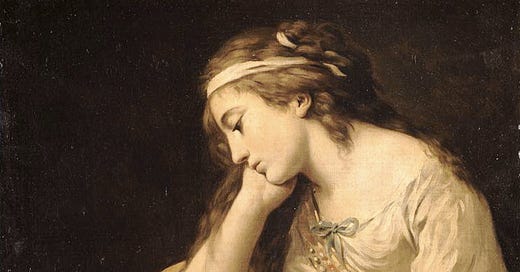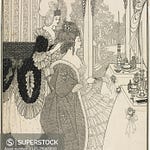For almost two thousand years in the West, there prevailed an oddball medical analysis of personalities, depending on which of four precious bodily fluids predominated in the body. These entered English as adjectives. If you had an excess of blood, you were sanguine, meaning that you were full of a boisterous and rambunctious optimism. Your football team is down 13 points at halftime, but your quarterback says, “Come on, guys, we’ve got them on the ropes! By the fourth quarter we’ll be in the lead!” He’s sanguine. But his offensive guard, all 350 pounds of him, smiles and shrugs and says, “Maybe, who knows?” And he galumphs onto the field, going to do his same old job as usual. He’s phlegmatic, meaning that he’s got more phlegm in him than most people have, and that makes him unflappable, pleasantly happy when things go well, and not too upset when they don’t. Meanwhile, your running back, who has been held to 15 yards, is absolutely furious, red in the eyes, eager to stuff it to the middle linebacker, his particular enemy. He’s choleric, meaning that he’s got more yellow bile than most, and it makes him quick-tempered, hot-headed, a real dynamo when he’s riled, which is often enough. And then there’s the old guy in the stands, a fan of the team before some of the players’ fathers were born, and he looks at the setting sun, thinking of other losses in the past, when his hopes were disappointed, but he still follows the team anyway, because he loves them. He’s melancholic, or, our Word of the Week, melancholy, a noun made into an adjective by the influence of its ending. Too much black bile.
That’s what afflicted “the melancholy Dane,” as Hamlet has been called, and, in a more endearing way, C. S. Lewis’s Puddleglum, the brave and pessimistic marsh-wiggle of happy memory. That was just their humor — meaning, that was the liquid that they had a double helping of. Yes, to be humorous once meant that you were especially notable as one of these four types. Then it came to denote any marked peculiarity in your personality, as when Ben Jonson, Shakespeare’s friend and fellow actor and playwright, wrote his play Every Man in His Humor. Since such peculiarities are often ridiculous, the sense was transferred from the liquid to the laughter: so we have humorous stories or shows. “I have an idea!” says Lucy Ricardo, and her friend Ethel Mertz says, “Oh no. Count me out!” But of course Lucy will dragoon Ethel into the crazy scheme she’s got in mind.
I think that all my friends know that I tend to melancholy. So you can picture me as a teenage boy in the dead of winter, in the woods with my dog, standing on a hill of glacial rocks, looking out at my town spread out far below, with their streets straggling up the facing mountain, and thinking about life — something sweet and sad at once. Or in the church when we lived in Allentown for two years, twenty minutes before school was to start, looking up at the ceiling and reading, Gloria in excelsis Deo, glad that I was there, and glad somehow that the church was dim with morning light filtering through the stained glass windows, and not bright or garish or noisy.
Melancholy, I think, doesn’t deserve the reputation it has. It’s not at all the same as depression. If it’s sad, it’s with a sadness that is warmer and more human than a lot of parties are, with people straining themselves to have a good time. It’s produced some of the most profound poetry in the world. We shouldn’t be surprised by that. For melancholy opens up the heart, without a shield of happy-making. The goddess Melancholy, says Milton, communes with heaven, “[her] rapt soul sitting in [her] eyes.” The spiritual life must embrace it, or it risks being reduced to an aggressive demand always to be smiling, always to be whooping it up. Imagine a room full of mural paintings all in white and yellow and sky-blue and pink. I think I’d go mad if I had to endure it more than five minutes! Imagine a book full of hymns in which there is never a minor chord. Insufferable! We need the minor chords. We need the shadows. God made them too, we may say.
And think of the great characters in fiction, prone to melancholy. Dickens gives us many of them, often in need of someone, usually a loving woman, to brighten their days and to keep them from indulging the sweet sadness too much, or even to direct their hearts toward the light. There’s Sydney Carton, the man who gains his life by losing it, in A Tale of Two Cities; there’s Eugene Wrayburn, in Our Mutual Friend, the lawyer who has no aim in life till he meets a beautiful and loyal woman, one far beneath him in social class, and he too must undergo a kind of resurrection from the dead. Huck Finn has a good share of the melancholy about him, as does Mr. Darcy in Pride and Prejudice, and the sensitive and easily wounded young Marianne Dashwood, in Sense and Sensibility. Or the panther Bagheera in The Jungle Book, or Rick in Casablanca. We could go on for a very long time.
The word melancholy is made up of two parts. The first part comes from Greek melas, melanos, meaning black, as in melanin, the pigment that determines how dark your skin is going to be. The second part comes from Greek khole, bile, and that in turn comes from an ancient Indo-European root, ghel-, meaning to shine, to gleam. That’s the part that has cousins all over the Indo-European map. Greek kh corresponds to prehistorical Germanic g, which later in Anglo-Saxon turned into y when it came before a vowel pronounced in the front of the mouth, like i, e, and ae (that is, a as in cat). The word’s Germanic English cousins have to do with either the bodily organ, as in gall, or with things that shine, especially if they are gold or yellow, and these also are in the family, as are English’s wealth of gl- words that refer to light, whether you see it with your eyes, as in gleam, glimmer, glow, or you feel it in your heart, as in glad and glee. From melancholy to gladness — and why not?
Listen to this episode with a 7-day free trial
Subscribe to Word & Song by Anthony Esolen to listen to this post and get 7 days of free access to the full post archives.













